On June 3, South Koreans elected Lee Jae-myung of the progressive Democratic Party of Korea (DPK) as their next president. This week’s snap presidential election brings a degree of closure to the political drama precipitated by former President Yoon Suk Yeol’s martial law declaration in December 2024. In the absence of elected leadership over the past six months, President-elect Lee must now restore public confidence in South Korea’s highest office and stabilize the economy. He must resist the cycle of retribution and vengeance against political opponents even as he upholds justice and accountability. The new government must also turn its attention to pressing foreign policy issues. Maintaining the U.S.-South Korea alliance amidst tough trade negotiations with the Trump administration will be among the new government’s highest priorities.
Lee has operated as a populist progressive throughout his political career, including a 2022 presidential run in which he lost the election by a razor-thin 0.7 points. To capture independent and undecided voters following Yoon’s impeachment, Lee shifted rightward, pitching himself as a more moderate candidate. Although South Korean progressives have typically pushed for greater autonomy from the U.S.-South Korea alliance, during the campaign, Lee professed firm support for the alliance.
Nevertheless, some in Washington fear that a “quiet crisis“ may be brewing between Seoul and Washington. Conservatives and even some centrists are skeptical of Lee’s tilt to the center and see him more as an opportunist than a pragmatist. More ideologically driven progressives within the ruling DPK may also press Lee to create distance between Seoul and Washington, particularly if the Trump administration reduces its security commitment on the Korean Peninsula or pushes South Korea beyond its comfort zone to deter China. However, shifting geopolitics and shared interests on North Korea policy may also allow for more flexibility and greater congruence in the alliance than currently perceived.
Toward pragmatic diplomacy
Lee’s foreign policy pragmatism emerged during his 2022 campaign when he tapped former career diplomat (and now national assemblyman) Wi Sung-lac as his foreign policy advisor. Early insights into Lee’s foreign policy vision appeared in a Foreign Affairs article titled, “A Practical Vision for South Korea” and included a call for “pragmatic diplomacy” toward neighboring countries, including China. Although Lee acknowledged Beijing’s increasing assertiveness, he argued that Seoul should cooperate with Beijing. Furthermore, Lee stated that “overt antagonism serves neither South Korea’s national interests nor its alliance with Washington.”
Fast-forwarding to 2025, Lee has double-downed on pragmatism, a concept that Lee will likely use to frame his foreign policy agenda. Notably, Lee has articulated his clear support for the U.S.-South Korea alliance while also demonstrating an openness to engage with countries with more adversarial relations with the United States such as China, North Korea, and Russia. For example, on May 18, Lee argued, “It’s clear the South Korea-U.S. alliance should remain the foundation of our diplomacy and security, and be further strengthened … But we should not go all in and put all our eggs in one basket.” Similarly, during his final presidential debate on May 27, Lee stated, “I believe the foundation of Korea’s diplomacy is the Korea-U.S. alliance,” while calling for it to be “developed substantively, gradually and in a future-oriented manner.”
Perhaps somewhat more controversially, Lee articulated on April 25, “The Korea–US alliance is indeed the foundation of the Republic of Korea’s foreign policy … And because bloc alignments also carry weight, trilateral cooperation among Korea, the US and Japan is also important. But we cannot be unilaterally bound to those alone … we should also maintain amicable relations with China and Russia — trade with them, and cooperate with them.” These statements suggest a shift away from former President Yoon’s “values-based diplomacy” toward a foreign policy of pragmatism.
President-elect Lee’s perspective on the U.S.-South Korea alliance and foreign policy
Who surrounds Lee as his key national security and foreign policy advisors may influence the direction of the president-elect’s foreign policy. Nevertheless, Lee’s statements offer the basic contours of the DPK foreign policy agenda and its approach to the U.S.-South Korea alliance.
First, Seoul’s relationship with Washington will continue to play an outsized role in South Korean foreign policy. Given North Korea’s ongoing nuclear threat and geopolitical tensions in the broader Indo-Pacific, Lee’s default position is to support the alliance. Even if the DPK seeks to wean itself from Washington, the United States remains the best guarantor of South Korean national security. As such, the DPK will do its best to work with the Trump administration to advance shared security interests. By extension, Seoul will continue to support the U.S.-Japan-South Korea trilateral barring some major incident that undermines bilateral South Korea-Japan relations.
Second, despite the U.S. alliance’s centrality, expect to see more hedging behavior from Seoul between Washington and Beijing. China remains South Korea’s largest trade partner and is critical to the nation’s supply-chain ecosystem. Lee thus aims to take a more conciliatory approach to China, and potentially Russia depending on the outcome of a ceasefire with Ukraine, underscoring the shift away from the previous government’s narrative of values-based diplomacy.
Third, Lee has indicated an openness to incremental engagement with North Korea while also easing military tensions and “restoring trust between the two Koreas.” Lee has suggested establishing an inter-Korean military joint committee and restoring communication channels to manage risks along the border. Lee’s posture of cautious engagement may align with Trump’s desire to reconnect with Kim Jong Un, but both leaders face a tough task in persuading Kim to return to diplomacy.
Fourth, Lee, much like his predecessor, will look to diversify foreign relations beyond the United States while dissociating himself from the Yoon government’s “global pivotal state” mantra. In the name of pragmatism and diversification, the new government will maintain South Korea’s partnerships with democratic nations including the Indo-Pacific Four (Japan, Australia, and New Zealand) and members of NATO and the European Union. Similarly, Lee will tout South Korea’s developmental success, supporting infrastructure investment and Southeast Asia as well as sending a limited amount of foreign aid to the developing world.
Opportunities and pitfalls in the U.S.-South Korea alliance
The new government’s immediate task is negotiating a trade deal with Washington and ensuring U.S. commitment to the security alliance. The outcome of the trade deal as well as discussions on alliance burden-sharing will likely set the tone for U.S.-South Korea relations under Trump and Lee. On the one hand, a win for both leaders on the trade deal will shore up Lee’s domestic legitimacy while improving South Korea’s standing in Trump’s eyes. Yet, on the other hand, U.S. unilateral demands in the absence of any concessions may push Lee to tilt further toward Beijing, raising the ire of the China hawks in the Trump administration. The Pentagon is pressing its allies in Asia to increase defense spending and strengthen deterrence against China. A Pentagon official recently acknowledged that the United States aimed to “modernize” the U.S.-South Korea alliance by calibrating United States Forces Korea (USFK) to deter China.
Lee and the DPK may resist the use of the alliance or USFK in operations directed against China. As Lee stated, “We must prioritize the national interest and avoid becoming too deeply involved in the China-Taiwan conflict … The idea is to respect the status quo and maintain an appropriate distance.” However, the Trump administration’s interest in USFK “strategic flexibility” could open a door for Lee to fulfill the DPK’s long-standing pledge of returning wartime operational control (OPCON transfer) from the United States to the South Korean military, especially if the Trump administration encourages South Korea to take on greater responsibility for its own defense.
Lee seeks to strengthen the U.S.-South Korea alliance while championing a more balanced diplomacy that improves relations with China and North Korea. Mending fences with U.S. adversaries while sustaining the alliance will require a tough balancing act, but between Lee’s pragmatism and Trump’s transactionalism, new opportunities for alliance cooperation may emerge.
-
Acknowledgements and disclosures
The author would like to thank Hanna Foreman for her research assistance on this piece, an anonymous reviewer for their helpful comments, and Adam Lammon for editing and Rachel Slattery for layout.
The Brookings Institution is committed to quality, independence, and impact.
We are supported by a diverse array of funders. In line with our values and policies, each Brookings publication represents the sole views of its author(s).

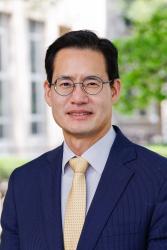
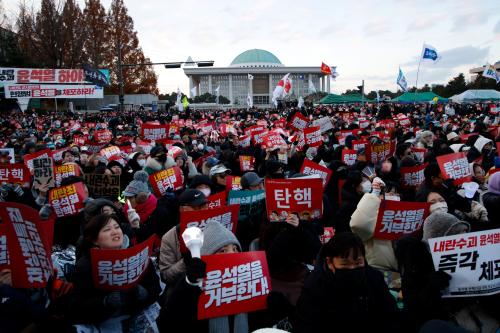
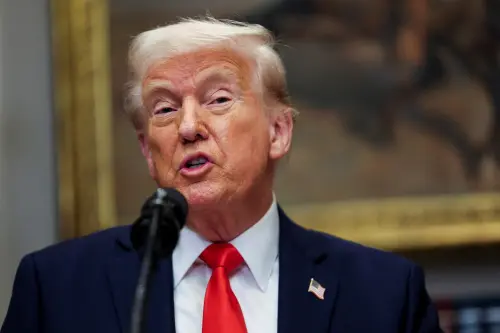
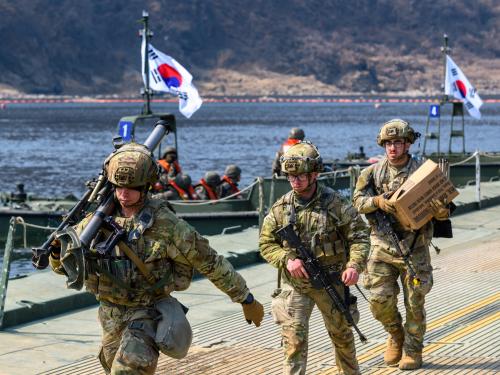
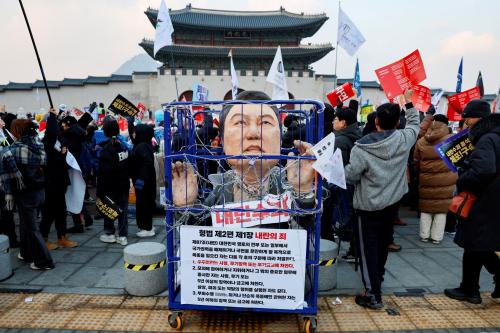
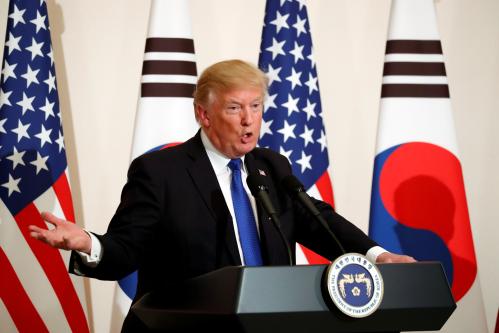
Commentary
What South Korea’s presidential election means for the US-Korea alliance
Some in Washington fear that a “quiet crisis“ may be brewing between Seoul and Washington.
June 3, 2025